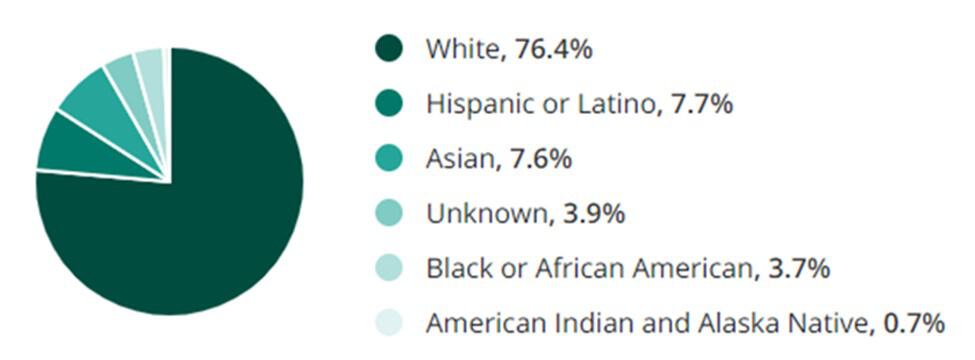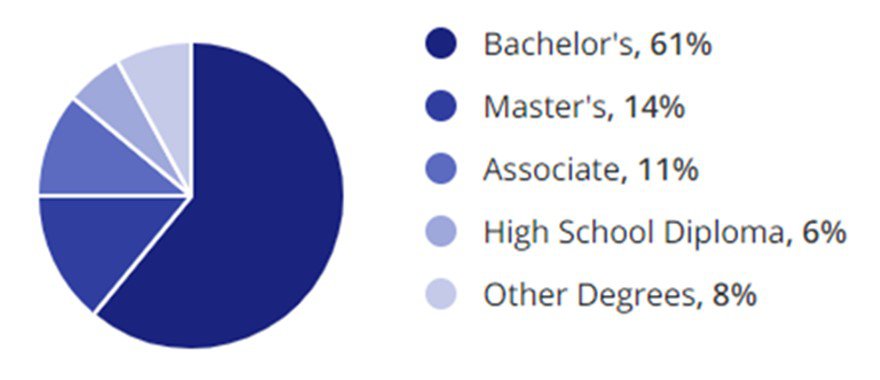Welcome to your comprehensive guide on navigating the dynamic world of executive careers. Whether you’re stepping into the executive arena for the first time or looking to elevate your career to new heights, you’ve come to the right place. This guide is designed to empower you, offering insights into educational paths, areas of expertise, and the ever-important skills that define successful leadership.
In the pursuit of executive roles—be it as a Chief Executive Officer, an Executive Director, or leading roles in finance, operations, and marketing—the journey is both challenging and rewarding. The landscape of executive employment is continually transforming, driven by technological advancements, the push for greater diversity and inclusion, and the evolving demands of the global market.
As we dive into the details of what it takes to secure and excel in executive jobs, we’ll explore the nuances of educational requirements, the diversity in demographics, current and future job outlooks, and the skills most in demand. Our goal is to equip you with the knowledge and tools you need to make informed decisions about your career path and to inspire action towards achieving your executive aspirations.
Embrace this guide as a roadmap to your executive dream job. The path to leadership is as unique as you are, and understanding the landscape is the first step toward realizing your potential. Let’s embark on this journey together, charting a course to success in the vibrant world of executive leadership.
Educational Requirements
To excel in executive jobs, a strong educational foundation is crucial. Most executive roles, including chief executive officer jobs and executive director jobs, require at least a Bachelor’s degree in business administration, finance, or a related field. An advanced degree, such as an MBA, often gives candidates an edge, providing them with the depth of knowledge needed for strategic decision-making and leadership.
Specific certifications can also be beneficial, depending on the sector. For example, a Project Management Professional (PMP) certification is valued in more operationally focused roles, while certifications in finance or technology might be more relevant for CFOs or CTOs, respectively.
Beyond formal education, continuous learning through workshops, seminars, and online courses can keep executives ahead in a fast-paced business world. Skills in new technologies, market trends, and global business practices are increasingly important.
For those looking into more niche roles like executive protection jobs or seeking flexibility such as in executive assistant jobs remote, specialized training and certifications relevant to security management or advanced digital tools will be advantageous.
Areas of Expertise
The world of executive jobs is diverse, offering various paths that cater to different strengths and interests. Understanding the primary areas of expertise can help you align your career goals with the right executive track. Here are key areas where executives can specialize:
- Finance: This specialty is ideal for those who excel in managing a company’s financial health. Chief Financial Officers (CFOs) play a pivotal role in financial planning, risk management, and financial reporting.
- Operations: Chief Operating Officers (COOs) focus on the smooth running of daily operations. This role is suited for individuals with a knack for process optimization and operational efficiency.
- Technology: With the digital transformation of businesses, Chief Technology Officers (CTOs) are in high demand. This area requires a deep understanding of current and emerging technologies, driving innovation within the company.
- Marketing: Chief Marketing Officers (CMOs) lead the charge in brand development, marketing strategies, and customer engagement. Creativity and strategic thinking are key traits for success in this domain.
Each of these specialties demands a unique set of skills and knowledge. As the business landscape evolves, executives must also adapt, often crossing into interdisciplinary roles or developing new areas of expertise, such as sustainability, human resources, or international business.
Staying informed about the shifting demands of these roles is essential for aspiring and current executives. By continuously enhancing your skill set and understanding the responsibilities associated with each specialization, you can better position yourself for leadership roles within your chosen field. Embrace the career growth journey by considering the broader implications of executive leadership and its impact on business success and societal progress.
Demographics in the United States
The landscape of executive leadership in the U.S. is a reflection of both progress and the ongoing need for diversity and inclusion efforts. The demographics within executive roles reveal insights into ethnicity, gender, and age representation, providing a snapshot of today’s business leadership and opportunities for growth.
Ethnicity/Race:
The ethnic and racial composition of executive jobs in the United States shows a predominance of White individuals, followed by a representation of diverse groups:
- White: 76.4%
- Hispanic or Latino: 7.7%
- Asian: 7.6%
- Black or African American: 3.7%
- Others (including Native Americans and Alaska Natives): 4.6%
Efforts to diversify leadership are underway, spurred by recognizing the benefits that different perspectives and backgrounds bring to decision-making and innovation.

Gender:
In terms of gender, there’s an ongoing shift towards balancing representation:
- Male: 56%
- Female: 44%
Despite significant strides in recent years, women remain underrepresented in executive positions. Initiatives aimed at supporting women’s leadership skills and addressing systemic barriers are essential for achieving gender parity in the boardroom.

Age:
Age demographics in executive roles reflect a blend of experience and seasoned leadership:
- Average Age: 50 years
Executives tend to bring a wealth of experience to their roles. However, there’s a growing appreciation for younger executives who can bring fresh perspectives and innovative approaches to leadership. Fostering a mix of ages can lead to more dynamic and effective leadership teams.
The demographic landscape of executive roles in the U.S. is slowly but surely shifting towards greater diversity. As businesses continue to recognize the value of broad representation among their leadership teams, the nature of executive demographics is expected to evolve, reflecting a more inclusive and diverse corporate culture.

Salary Trends
The compensation for executive roles spans a wide range due to factors like company size, industry, location, and individual performance. In the United States, executives can expect salaries that reflect the high level of responsibility and expertise required for these positions.
- Average Salary Range: $150,000 to $5,000,000+
- Top executives in major corporations often earn more, especially when considering bonuses and stock options.
Specifically, executive director and chief executive officer jobs are among the highest-paid positions, with compensation packages designed to attract and retain the best talent. Salary trends also indicate a growing recognition of the value provided by roles such as executive assistant jobs remote and executive protection jobs, reflecting their critical support to executive functions and overall business operations.
Understanding salary trends is important for both job seekers and employers. For aspiring executives, knowing the financial rewards can help in planning career paths and negotiating compensation. Employers must stay competitive by offering attractive salary packages to attract top talent. For more insights into specific roles and industry standards, resources like the Embracing Career Change as a Diverse Candidate guide can be valuable.
Hiring Trends
The demand for seasoned and effective executives remains robust as businesses navigate an increasingly complex global landscape. The role of executives in steering companies toward success is more crucial than ever, with several notable hiring trends shaping the market:
- Emphasis on Diversity: Companies are actively seeking to diversify their leadership teams. This includes a focus on gender, ethnicity, and cultural backgrounds. The move towards inclusivity aims to enhance creativity, decision-making, and global reach.
- Technological Savvy: With digital transformations across industries, knowledge of tech trends, digital marketing, and cybersecurity are becoming pivotal for executive roles, particularly for Chief Technology Officers and Chief Information Officers.
- Adaptability and Resilience: The capacity to navigate through uncertainty and lead through change is highly valued. This skill set is sought after in the wake of global challenges and market fluctuations.
- Global Perspective: Executives with international experience or the ability to manage across global markets are in demand. Businesses with a worldwide presence look for leaders who can navigate cultural differences and execute global strategies.
Additionally, the rise of remote work has broadened the scope for hiring, with companies more open to considering candidates who may not be local but possess the right skills and leadership qualities. The appetite for hiring executives capable of leading remote or hybrid teams effectively is on the rise.
Staying ahead of these trends is crucial for executives seeking opportunities and companies aiming to secure the best leadership talent. For further insights into adapting to changing employment landscapes, consider exploring Applying for Remote Jobs: Working Successfully from Anywhere in the World. This shift towards a more dynamic and diverse executive hiring practice signals a transformative period in leadership recruitment.
Education Levels
In the competitive landscape of executive jobs, the level of education can significantly impact career progression. While a bachelor’s degree forms the foundation for aspiring executives, higher educational achievements often set candidates apart in the job market. Here’s a breakdown of the education levels typically associated with executive roles:
- Bachelor’s Degree: Most executive positions require at least a bachelor’s degree in relevant fields such as business, economics, or finance.
- Master’s Degree: Advanced degrees, especially an MBA, are highly valued and often seen as a critical stepping stone for executive careers. Specialized master’s degrees in fields such as marketing, IT, or human resources are also beneficial.
- Doctorate: While not as common, a Ph.D. or other doctorate degree can offer a competitive edge for positions in research-intensive industries or roles that demand deep domain expertise.
- Certifications: Professional certifications related to project management, finance, technology, and other specific skills can complement academic degrees, showcasing a commitment to lifelong learning and expertise in niche areas.
Continuing education, such as executive education programs offered by leading business schools, provides current executives and those aspiring to such roles with the tools needed to navigate complex business challenges and stay updated with the latest industry trends.
The diversity in education levels among executives reveals a broad landscape of knowledge and skills within the leadership pool. Aspiring executives should consider their education path as a pivotal element of their career strategy, selecting programs and certifications that align with their career goals and the demands of the executive roles they aim to secure.

Skills in Demand
In the realm of executive leadership, the right blend of skills can propel careers and companies forward. As the business environment continues to evolve, certain skills stand out for their critical importance in effective executive roles. Here are the skills in high demand:
- Strategic Planning: The ability to develop and implement forward-thinking strategies is paramount. Executives must anticipate market shifts and steer their organizations toward long-term success.
- Financial Acumen: Understanding financial metrics and managing budgets effectively are essential skills, particularly for roles like CFOs. Sound financial decision-making underpins company health and growth.
- Leadership: Inspiring and leading teams toward cohesive goals is a core competency. This includes fostering an inclusive work environment that values diversity and collaboration.
- Crisis Management: The capacity to navigate through crises and manage risks effectively is more critical than ever, requiring calm decision-making and agile response strategies.
- Technology Proficiency: With the digital age reshaping industries, familiarity with digital tools, data analytics, and cybersecurity measures is crucial.
- Global Awareness: For businesses operating on an international scale, understanding global market trends and cultural nuances is necessary for strategic global positioning.
These skills are supplemented by softer talents such as emotional intelligence, communication, and the ability to foster innovation. For executives, continual learning and adaptation are keys to maintaining relevance and effectiveness in their roles.
As you navigate your executive career path, focusing on developing these in-demand skills can significantly enhance your leadership capabilities and marketability. In a landscape where change is the only constant, investing in yourself is the best strategy for success.
Current & Future Executive Jobs Outlook
The landscape for executive jobs is challenging and ripe with opportunities as organizations navigate the complexities of the modern business environment. As industries evolve, so do the roles and expectations of executives. Here’s what we know about the current and future outlook for executive positions:
- Steady Demand: Despite economic fluctuations, the demand for strategic, forward-thinking executives remains stable. Leadership cannot be automated, ensuring ongoing opportunities for skilled professionals.
- Digital Transformation: The digital revolution continues to impact all sectors, creating a growing need for executives who can lead digital initiatives and harness the power of technology for business innovation.
- Sustainability and Social Responsibility: There’s a surge in demand for leaders who can drive sustainability initiatives and corporate social responsibility (CSR) efforts, reflecting the growing importance of environmental and social governance (ESG) in business strategies.
- Globalization: As businesses expand their reach across borders, executives with a global mindset and international experience are highly sought after. The ability to navigate different cultural and market landscapes is crucial.
- Diversity and Inclusion: There’s a concerted effort across many industries to enhance diversity within executive teams. Companies recognize the value of diverse leadership in fostering innovation and better reflecting their customer base.
The future trajectory for executive roles suggests an increasing emphasis on adaptability, technological fluency, and an astute understanding of global issues. Keeping a pulse on these trends is essential for individuals aspiring to executive positions or aiming to secure their next executive role.
Equipping oneself with the necessary skills, embracing lifelong learning, and cultivating a broad, inclusive perspective on leadership will be key differentiators in the competitive executive job market. As we look ahead, the role of the executive will undoubtedly continue to evolve, offering both challenges and opportunities for professional growth and organizational impact.
FAQ’s
What education is needed for executive roles?
Most executive positions require at least a Bachelor’s degree in fields such as business administration, finance, or related subjects. An MBA or other relevant Master’s degree are highly advantageous, positioning candidates for success in these roles.
What skills are crucial for executives?
Key skills include strategic planning, leadership, financial acumen, crisis management, and technological proficiency. Soft skills such as emotional intelligence, excellent communication, and adaptability are equally important.
Is experience more important than education for executive jobs?
Both education and experience play vital roles. While advanced education can open doors and provide key knowledge, practical leadership experience is indispensable for executive success.
Can I become an executive without a traditional career path?
Yes. While many executives come from a traditional business background, there is growing recognition of the value of diverse experiences. Unique paths can offer fresh perspectives and innovative approaches to leadership.
How are executive roles changing in the digital age?
Executives today must navigate digital transformation, emphasizing the importance of understanding and leveraging technology. Digital literacy, knowledge of emerging tech trends, and the ability to lead digital initiatives are increasingly crucial.
What is the employment outlook for executive jobs?
The demand for effective leadership ensures a consistent need for executives. However, the specific outlook varies by industry and specialization. Staying attuned to industry trends and developing relevant skills is key to seizing opportunities.
These FAQs offer a glimpse into the world of executive careers. As the business landscape evolves, so do the pathways to leadership. Whether you’re embarking on your executive career or seeking to advance further, maintaining a proactive and informed approach is imperative.
Additional Resources
Becoming a successful executive involves continuous learning and networking. Here are some additional resources that can provide valuable insights and support for your executive career journey:
- The U.S. Bureau of Labor Statistics offers comprehensive data on the outlook for top executive positions, including employment trends and salary information.
- For those interested in enhancing their leadership skills, the Harvard Business Review provides articles, research, and case studies on a wide range of management topics.
- Networking and professional development opportunities are available through organizations like the National Diversity Council, which promotes diversity and inclusion in the workplace.
- The Small Business Administration (SBA) offers resources and guidance for executives leading small to medium-sized businesses, including workshops and mentoring programs.
- Nonprofit executives can find support and resources through the National Council of Nonprofits, which offers tools and information on governance, leadership, and management.
These resources can be instrumental in staying informed on industry trends, understanding the challenges facing today’s leaders, and finding opportunities for professional development. Whether you want to enhance your leadership style, explore executive career paths, or connect with peers, tapping into these resources can provide significant benefits.
Conclusion
The journey to becoming a successful executive is multifaceted, requiring a blend of education, experience, and the right set of skills. The landscape of executive jobs is dynamic, with a growing emphasis on diversity, technological proficiency, and global awareness. As industries evolve, so do the opportunities for aspiring leaders to make a significant impact.
To those on the path to executive leadership, we encourage you to leverage every resource at your disposal. Stay curious, be open to continuous learning, and embrace the diversity of experiences and perspectives that shape effective leadership. The journey is one of constant growth and adaptation, with the rewards being personal achievement and the chance to drive meaningful progress in your organizations and communities.
We invite you to join Diversity Employment. Our platform connects skilled professionals with companies that value diversity and inclusion. By creating an account, you gain access s to exclusive diverse staffing jobs, networking opportunities, and resources designed to support your career development. Let us be part of your journey to executive success. Together, we can create a more inclusive and dynamic business world.




